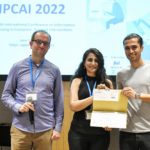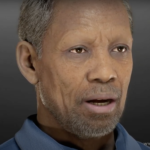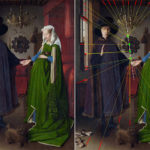

Congratulations to the Tangram team (CNRS, Inria, Université de Lorraine), winner of the Best Paper Award at the IPCAI conference (International Conference on Information Processing in Computer-Assisted Interventions).
The conference, a leading event for innovation in the field of computer-assisted surgery, was held in Tokyo in June.
The prize rewards the work of Nariman Khaledian, Pierre-Frédéric Villard and Marie-Odile Berger on the simulation of fluid-structure interaction in the heart mitral valve. This work will enable practitioners to refine their diagnoses and increase their knowledge of this organ.

The Dynalips technology allows to precisely synchronize the lip movements of 3D characters and the words they are supposed to pronounce. This lipsync technology, based on the research work of Slim Ouni, associate professor in computer science and member of the Multispeech team (CNRS, Inria, University of Lorraine), offers a fast solution to precisely and automatically synchronize the lip movements of a 3D character with speech.

Open source and covering forty-six different languages, BigScience is a new artificial intelligence heavyweight offering natural language processing. Claire Gardent, a CNRS research director at the LORIA and winner of the CNRS Silver Medal, who also sits on the project’s steering committee, explains the principle as well as its potential applications.

Rémi Decelle, a Ph.D. student in the Adagio team and at INRAE, received the Best student paper Award at the DGMM 2021 conference, International Conference on Discrete Geometry and Mathematical Morphology. This prize was awarded to him for his article entitled Digital Straight Segment Filter for Geometric Description, Rémi Decelle, Phuc Ngo, Isabelle Debled-Rennesson, Fleur Longuetaud, Frédéric Mothe.

In art history, it is commonly accepted that the Flemish painter Jan Van Eyck knew nothing of the laws of perspective. Gilles Simon, lecturer at the University of Lorraine and researcher at the LORIA computer science laboratory (CNRS, Inria, University of Lorraine), carried out a probabilistic analysis of five paintings of the artist between 1432 and 1439 and revealed that the painter was in fact far ahead of his time thanks to computer vision methods. He used an advanced perspective machine with two degrees of freedom to represent space as closely as possible to human vision. This surprising discovery solves a major enigma of art history and means Jan Van Eyck is the pioneer of techniques such as augmented reality or synthetic holography.
